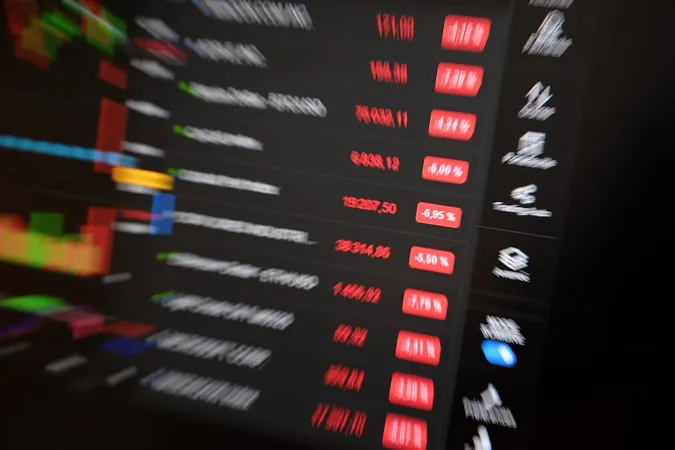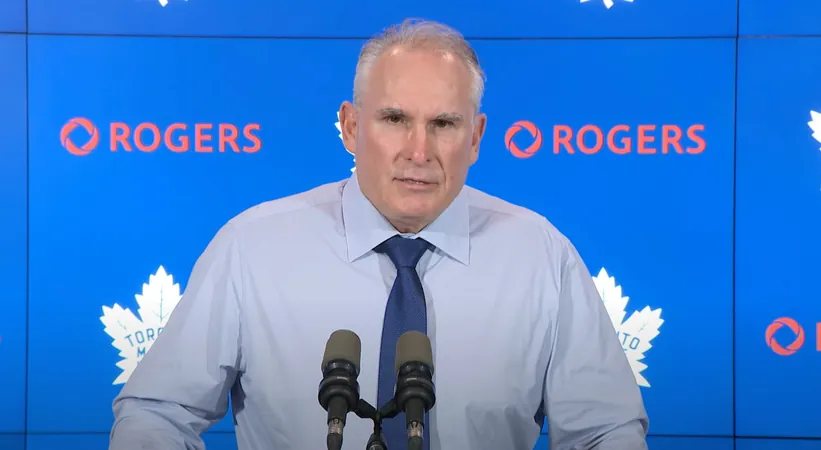
Market Dilemma: Experts Weigh In on the Inevitable End of the Bloodbath
2025-04-07
Author: Benjamin
The financial markets experienced a shocking decline on Monday after a tumultuous week that erased a staggering $6.4 trillion from the value of U.S. equities. Worries of an impending recession have been amplified by reactions to President Donald Trump's controversial tariff strategies, which have left traders feeling uneasy. Amidst the chaos, many investors are left contemplating whether the moment of capitulation—when the overwhelming selling pressure subsides—will soon present itself, marking a potential market bottom.
David Rosenberg, Founder of Rosenberg Research:
Rosenberg emphasizes that historically, the end of a bear market cycle is characterized by soaring volatility, evidenced by the VIX index, along with tangible catalysts. He points to the trade war as a complex issue but notes that any signs of de-escalation could signal good news for the markets. Rosenberg believes the resolution may come not from the President's actions but from concessions made by U.S. trading partners, giving Trump a narrative of victory. The upcoming midterm elections in 2026, coupled with the stock market's performance and presidential approval ratings, are crucial factors to monitor. A reversal in aggressive trade policies could prompt a swift market rebound.
Analysts from Deutsche Bank, led by Parag Thatte:
This team has reported that investor positioning dropped sharply after dire tariff announcements, wherein the S&P 500 witnessed a 10% plunge over just two days—a rare occurrence in the last 85 years. Given this shift in positioning, they predict the market will experience a two-way nature moving forward, where favorable headlines could incite rallies. However, increased volatility raises the prospect of deeper corrections, potentially mirroring historical downturns. They reiterate that substantial recovery can only happen with clearer indications of trade policy moderation.
Brian Belski, Chief Investment Strategist at BMO Capital Markets:
Belski characterizes the current market climate as a worst-case scenario, arguing that the administration ultimately might be compelled to renegotiate tariffs in favor of a pro-growth narrative. He points to historical trends that show large declines are often followed by swift recoveries, and long-term investments remain a successful strategy. Notably, Canadian stocks have demonstrated resilience despite turbulent market conditions, outperforming the U.S. indices for seven consecutive weeks.
Paul Ashworth, Chief North America Economist at Capital Economics:
Ashworth posits that Trump is likely to negotiate deals, though China may remain a holdout. As minor concessions are accepted, a positive market response could emerge, especially if tariffs on various goods are reconsidered or lifted.
Lori Calvasina, Head of U.S. Equity Strategy Research at RBC Capital Markets:
Calvasina has adjusted her earnings forecasts for the S&P 500 and acknowledges that the current market conditions present a range of potential outcomes. A sizable drop from current levels may manifest if investor sentiment continues to sour, but cautious optimism remains for a recovery trajectory, especially post-correction.
Manulife John Hancock Investments’ Co-Chief Investment Strategists, Emily Roland and Matt Miskin:
They view U.S. large cap stocks as more affordable now, though not cheap. With earnings growth estimates appearing optimistic, they remain neutral on large caps while favoring mid-cap equities, which are considered higher-quality assets at better valuations.
As the market grapples with this volatility, analysts coincide on one point: navigating these turbulent waters wisely, while remaining patient and informed, can potentially yield fruitful opportunities for astute investors. Investors should keep a close eye on tariff developments as the negotiations unfold—they may just forecast the market’s next big move.









 Brasil (PT)
Brasil (PT)
 Canada (EN)
Canada (EN)
 Chile (ES)
Chile (ES)
 Česko (CS)
Česko (CS)
 대한민국 (KO)
대한민국 (KO)
 España (ES)
España (ES)
 France (FR)
France (FR)
 Hong Kong (EN)
Hong Kong (EN)
 Italia (IT)
Italia (IT)
 日本 (JA)
日本 (JA)
 Magyarország (HU)
Magyarország (HU)
 Norge (NO)
Norge (NO)
 Polska (PL)
Polska (PL)
 Schweiz (DE)
Schweiz (DE)
 Singapore (EN)
Singapore (EN)
 Sverige (SV)
Sverige (SV)
 Suomi (FI)
Suomi (FI)
 Türkiye (TR)
Türkiye (TR)
 الإمارات العربية المتحدة (AR)
الإمارات العربية المتحدة (AR)